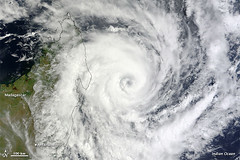By Billy Aldridge
While we may have dodged a bullet when it came to
Tropical Storm Andrea, this may only be a taste of
 |
| Tropical Cyclone Bingiza (Photo credit: NASA Goddard Photo and Video) |
what’s to come as we
Floridians slog through yet another hurricane season. Since it’s always a good policy to hope for
the best and prepare for the worst, I thought I’d take some time to talk about
how to prepare your home’s plumbing for nature’s wrath. While most people are more concerned with
stocking the shelves and making sure that they have enough batteries and
candles should the lights go out, there are a number of plumbing-related issues
that you need to cross off your hurricane checklist before the next big blow.
1. Nobody
is concerned with potable water until there is none to be had. When hurricane conditions are imminent, you
should fill your bathtub and a number of pots and pitchers with water, since the
flooding that accompanies a hurricane brings with it a host of bacteria. While you can always boil water in order to
kill pathogens, if you have an electric stove and the power goes out, this
might not be feasible. So stocking up on
water to drink and bathe in before the storm hits is always a good idea.
2. Once
the water starts to rise, the last thing you want to do is flush the
toilet. This is a sure way to flood the
bathroom. As distasteful as this might
sound, you need to have a bucket, plastic bags and baby wipes handy for just
such a contingency. Better safe than
sorry.
3. Make
sure all your drains and sewers are free of leaves and debris. The last thing you want to do is have water
back up into your home when the lightning is flashing and the rain is coming
down in sheets. If your drains have
been slow to remove water after an afternoon shower, now is the time to have
your local plumber inspect them for root intrusion. I have actually seen water geyser up from
blocked drains during major storms.
While most people worry about wind damage, flood damage is far more
prevalent and costly to repair.
4. Other
nasty things that can accompany storm waters are snakes, rodents, bugs and
mold, all of which would much prefer to spend their time inside your home
during and after the storm. This means
you need to check for holes in screens, missing or damaged weather stripping
and cracks in walls and broken seals around pipes, all of which can admit
creepy crawlies.
5. Locate
and test all the water shut off valves in your home. Should a pipe burst or water start to
backflow into your home, you need to know how to shut off the water to part or
all of your home. (See video above to
learn how to locate and shut off your water main.) As bad as conditions are outside, the last
time to start looking for the shutoff is when crud starts infiltrating your
home via the plumbing. You also need to
locate and test the shutoff valves on your toilets, sinks, water heater and
washing machine to make sure they shut completely. If you haven’t exercised these valves in
years they may have frozen shut and need to be either lubricated or replaced
Billy Aldridge is one of the Doctors of Plumbology at Aldridge & Sons Plumbing in Jacksonville, Florida. To see more helpful how-to videos go to http://plumbers-jacksonville-fl.com

Now is the time to prepare for hurricane season. Don't wait until the next big storm starts knocking at the door to take preventative action.
ReplyDeleteThanks for the tips. You definitely brought up tips I would never have thought of
ReplyDeleteExcellent information. So much more to preparing than I was aware of.
ReplyDelete